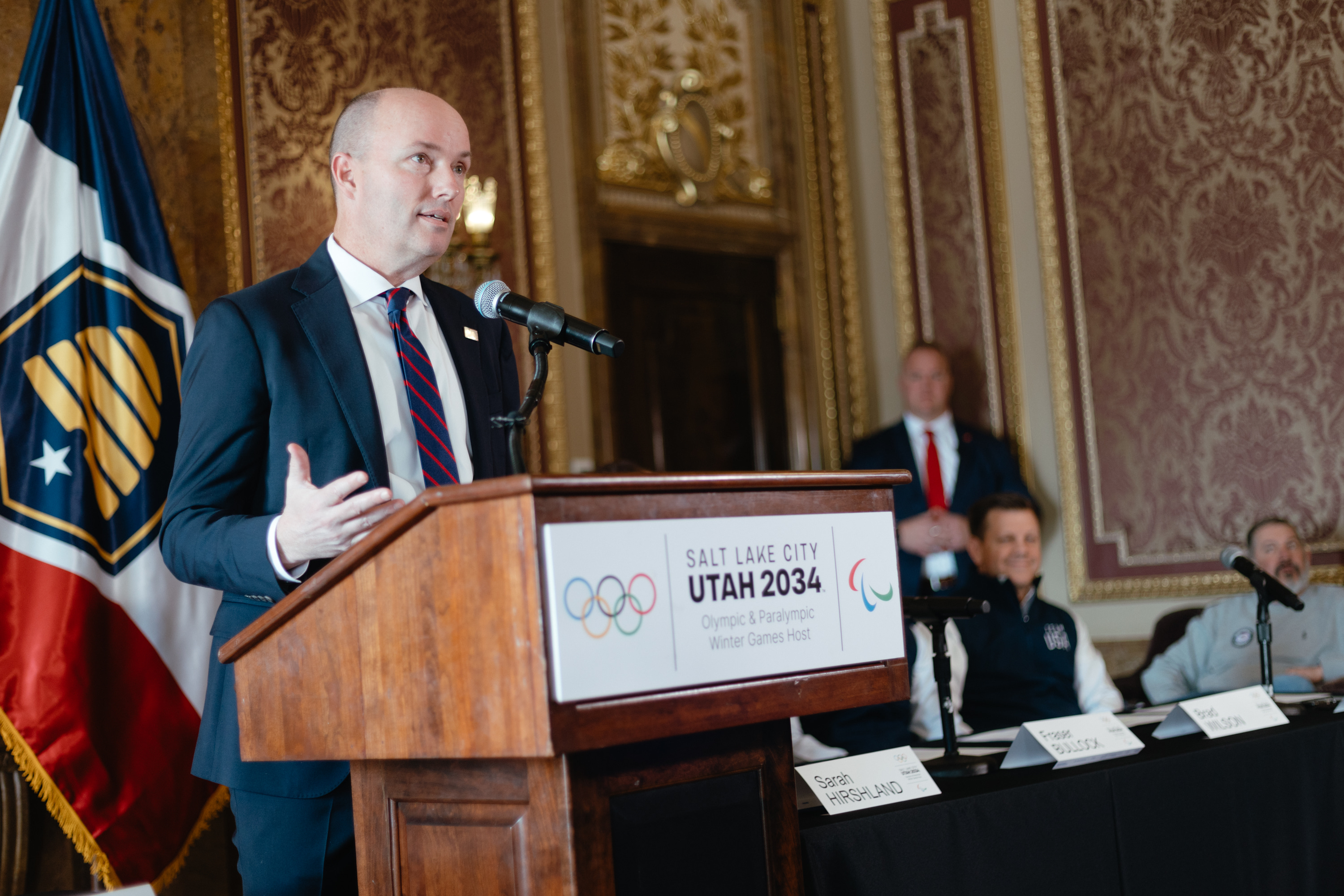02/20/25
Best of the West: Exploring public lands for housing; Utah Olympics; Space Commission; Maui wildfire settlement; and monarch migration

The Western Governors' Association keeps you updated on the latest news in the West. Here are the top stories for the week starting February 17, 2025. (Photos courtesy of Adobe Stock Images, Summit County Colorado, and the Office of Utah Governor Spencer Cox).
In a recent story for the Washington Post, reporter Rachel Siegel looked into the potential for western states to use certain tracts of federal land to build much-needed housing. The story, which mainly focused on housing shortages in Las Vegas, featured Western Governors’ work on this issue and their discussion at WGA’s 2024 Winter Meeting in Las Vegas.
With the majority of public lands located in the West, Governors from our region have been leaders on the idea of utilizing certain parcels of state and federal land for housing. Already, Governors and state houses across the West are putting this idea into practice, with housing units going up on public lands around the region.
In Nevada, new developments on former federal land like Heirloom at Pebble – a 195-apartment development for low-income seniors – are set to open this year. Another 20-acre plot of federal land in Las Vegas, which was appraised at almost $20 million, was recently sold to Clark County for just $2,000. It will soon host 210 homes for households making $70,000 or less per year.
Sales of federal lands like these are possible thanks to a 1998 law that allows for the sale of Bureau of Land Management land in a specific area near Las Vegas for as little as $100 an acre.
Governor Joe Lombardo recently urged his state legislature to submit a resolution to Congress and President Trump calling for the release of more federal lands in Nevada to spur housing development. In his letter, Governor Lombardo noted that nearly 87% of land in Nevada is controlled by the federal government, and projections indicate that Washoe and Clark Counties could run out of developable land within the next seven years.
At WGA’s 2024 Winter Meeting, New Mexico Governor Michelle Lujan Grisham told the Washington Post that she would support a standardized model to gain access to federal land for housing development, so long as it didn’t come with environmental consequences.
Along with Governors Lujan Grisham and Lombardo, the Governors’ discussion about public lands for housing at the Winter Meeting in Las Vegas featured Utah Governor Spencer Cox, Wyoming Governor Mark Gordon, Colorado Governor Jared Polis, and Hawaii Governor Josh Green, all of whom face unique housing challenges in their states.
Other exciting developments in this space include a first-in-the-nation workforce housing project in Colorado, which plans to site 162 income-based rental units on U.S. Forest Service land. The deal allows the Forest Service to lease 11 acres of land in the mountain town of Dillon to build housing for Forest Service employees and other area residents.
in the mountain town of Dillon to build housing for Forest Service employees and other area residents.
Managers with the Bridger-Teton National Forest in Wyoming have considered a similar arrangement in the town of Jackson.
In addition to the possibility of opening up some federal lands for housing, state governments across the West are looking into utilizing state-owned land as well.
States like Utah, New Mexico, Colorado, and Washington have already used parcels held in state-owned land trusts or other state entities to build affordable housing, senior housing, and other attainable developments.
In Hawaii, state-owned land was used to quickly site 450 homes for wildfire survivors in Maui.
To learn more about the Governors’ work on housing, explore New Mexico Governor Michelle Lujan Grisham’s WGA Chair initiative, BRAND West. Additionally, click here to read more about WGA’s 2024 Winter Meeting and the Governors’ discussion of public lands and housing.
Utah Olympics: officials in Utah have selected an official organizing committee in preparation for the 2034 Winter Olympic Games in Salt Lake City. Alongside a select group of Olympians, business leaders, former legislators, and others, Governor Spencer Cox will serve as an honorary chair on the board. 
“We’ve been saying 10 years for a long time. Now it is nine years, and that clock keeps ticking,” said Governor Cox. “There’s a lot for us to do, and we have the right team in place to get it all done.”
The committee also plans to collaborate with their partners in Los Angeles, which will host the 2028 Summer Olympic Games.
Space Commission: in Arizona, Governor Katie Hobbs relaunched the state’s Space Commission, which has been dormant for the past decade. The commission will help keep Arizona at the forefront of space technology while creating jobs and growing the state’s workforce in critical industries.
“Creating economic opportunity and advancing innovation are essential to realizing the Arizona Promise,” said Governor Hobbs. “The newly launched Arizona Space Commission will solidify our state's leadership in space exploration and help grow our workforce in critical industries of the future.”
Maui wildfire settlement: in a recent decision, the Hawaii Supreme Court ruled unanimously in favor of the state to allow a $4 billion dollar Maui wildfires litigation settlement to move forward over challenges from insurance companies.
“As Governor of Hawai‘i, I welcome the state Supreme Court’s unanimous decision to uphold the $4 billion Maui wildfire settlement. We reached this historic settlement for the wildfire survivors on Maui through a collaborative effort to do what is right (pono), for our people, consistent with our values,” said Governor Josh Green. “The settlement came exactly one year after the fire occurred, when most felt it could take five years or more to reach agreement. Today’s decision will help our people heal much sooner, as we continue to rebuild and recover.”
Monarch migration: every year, monarch butterflies migrate thousands of miles from Canada and the northern U.S. to warmer climates in Mexico or Southern California. Recently, however, researchers have noticed a sharp decline in the winter population of these butterflies, indicating a threat to the species that may soon be protected under the endangered species act.
To support the population, Denver’s Butterfly Pavillion is now working with the Government of Mexico to support and restore the overwinter habitat for butterflies in Mexico, which has been substantially reduced.
“This project represents hope—for the Monarch butterfly and the ecosystems it helps sustain,” said Nathalie Brochu, the Interim CEO of Butterfly Pavilion in a press release. “Restoring these vital habitats isn’t just about saving a species. It’s about ensuring that future generations can witness the wonder of the Monarch migration and the cultural and ecological richness it embodies.”